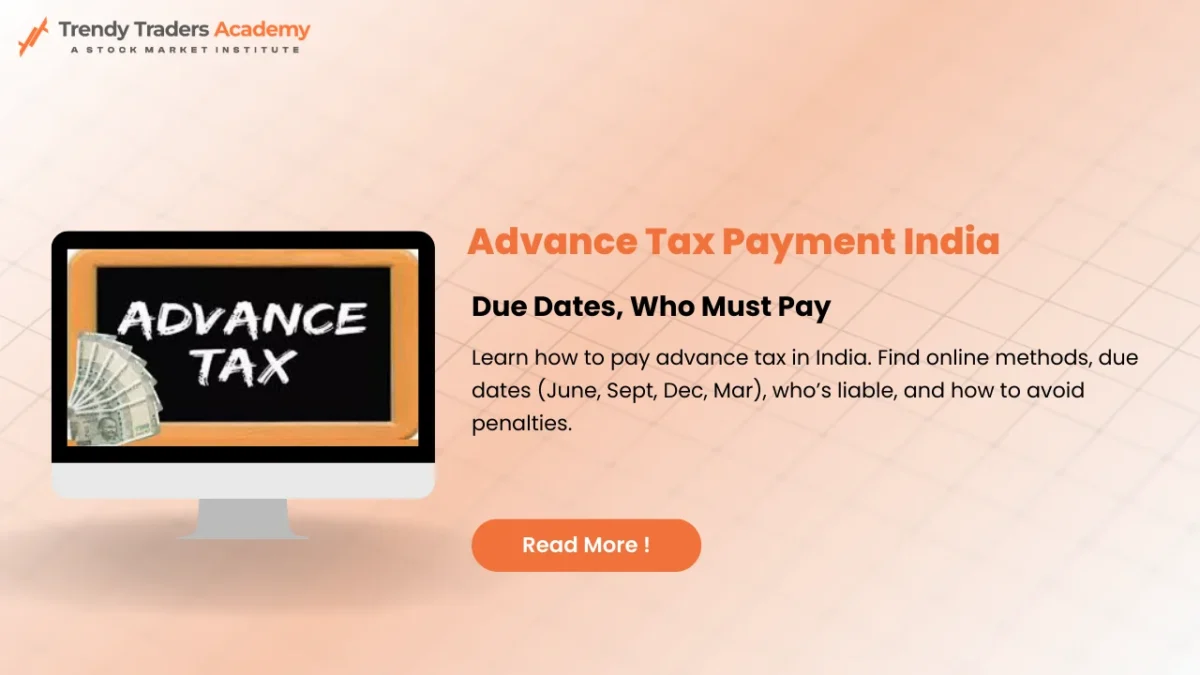Advance Tax Payment: A Complete Guide for Individuals
Introduction
Have you ever wondered if waiting until the last minute to pay taxes costs you more? Just like watering a plant regularly keeps it healthy, paying taxes in advance keeps your financial record clean and stress-free. Advance tax is not just for business owners—it also applies to salaried individuals, freelancers, and even people earning income from the stock market.
In this article, we will break down the concept of advance tax payment in simple terms, using relatable examples so you never feel lost. Along the way, we will connect it with ITR return, IT return filing, and even why a stock market course online can help you with better tax planning.
Learn all about advance tax payment, itr return, it return filing, and stock market course online with this simple guide for the general public.
What is Advance Tax?
Advance tax is often called the “pay-as-you-earn” tax. Instead of waiting until the end of the year, you pay your estimated tax liability in installments during the financial year. Think of it as paying in small pieces rather than facing a mountain of tax at once.
Who Needs to Pay Advance Tax?
- Salaried Employees (if they have other sources of income like rent, stocks, or interest)
- Freelancers & Consultants (since TDS may not cover all their income)
- Business Owners (with regular or irregular cash flows)
- Stock Market Traders & Investors (short-term gains, intraday profits, F&O income)
If your total tax liability is ₹10,000 or more in a financial year, you must pay advance tax.
Importance of Paying Advance Tax
- Avoids last-minute financial stress
- Prevents penalty charges under Income Tax law
- Builds financial discipline
- Maintains a clear record for ITR return filing
Understanding Advance Tax Slabs
Advance tax does not have separate slabs—it depends on the regular income tax slabs. For example:
- Income up to ₹2.5 lakh – No advance tax
- ₹2.5 lakh to ₹5 lakh – 5%
- ₹5 lakh to ₹10 lakh – 20%
- Above ₹10 lakh – 30%
(Additional cess and surcharges may apply.)
Due Dates for Advance Tax Payments
The Income Tax Department sets four key deadlines within a financial year:
- 15th June – Pay at least 15% of total tax due
- 15th September – Pay at least 45% of total tax due
- 15th December – Pay at least 75% of total tax due
- 15th March – Pay 100% of total tax due
Missing these dates results in penalty charges.
How to Calculate Advance Tax?
The calculation involves three steps:
- Estimate your total income for the year (salary, business, stock gains, rent, etc.).
- Subtract deductions under sections like 80C, 80D, etc.
- Apply the tax slab rate and reduce any TDS already deducted.
The remaining amount must be paid as advance tax.
Advance Tax for Salaried Individuals
If your only income is salary, your employer deducts TDS, so there’s usually no advance tax liability. However, if you earn from stock trading, freelancing, or rental income, you may need to pay advance tax separately.
Advance Tax for Freelancers & Professionals
Freelancers often have irregular incomes. Advance tax helps break the payment burden into quarterly installments, making tax management easier.
Advance Tax for Stock Market Investors
Many investors ignore this, but short-term capital gains and F&O trading profits are taxable. Advance tax ensures you don’t face surprises at the year-end during IT return filing.
Methods to Pay Advance Tax Online
- Visit the Income Tax e-Filing Portal
- Choose Challan 280 for advance tax
- Make payment via Net Banking or Debit Card
- Download Challan receipt as proof of payment
Consequences of Not Paying Advance Tax
- Interest penalty under sections 234B and 234C
- Stress during ITR return filing
- Poor credit profile if delays are frequent
Link Between Advance Tax and ITR Return
Advance tax isn’t the final step. After paying, you still need to file your ITR return to reconcile incomes, claim refunds, or adjust excess tax paid.
Step-by-Step Guide to IT Return Filing
- Gather income details (salary slips, business income, stock trading, etc.).
- Use Form 16 (for salaried individuals).
- Log in to Income Tax Portal.
- Select the correct ITR form.
- Enter income, deductions, and advance tax paid.
- Submit and e-verify.
Why Learning Stock Market Online Helps in Tax Planning
Taking a stock market course online helps individuals understand how market income is taxed, how to set aside profits for taxes, and how to smartly reduce liability using legal deductions.
Final Tips for Hassle-Free Tax Payment
- Start estimating your income early.
- Use income tax calculators online.
- Pay before deadlines to avoid penalties.
- Keep proper records for smooth IT return filing.
Conclusion
Advance tax may sound complicated, but when broken into steps, it’s like climbing a ladder—one step at a time. By paying regularly, you avoid penalties, simplify your ITR return filing, and maintain financial peace of mind. Whether you are salaried, a freelancer, or dabbling in stocks, knowing your advance tax obligations will keep you ahead in your financial journey.
FAQs
1. What is the penalty for late payment of advance tax?
If you don’t pay advance tax on time, interest under sections 234B and 234C is charged.
2. Do salaried individuals need to pay advance tax?
Yes, if they have income beyond salary such as rent, stock market profits, or freelancing income.
3. Is advance tax applicable on stock market income?
Yes, short-term capital gains, day trading income, and F&O profits require advance tax payment.
4. How can I pay advance tax online?
You can pay through the Income Tax portal using Challan 280 via net banking, debit cards, or authorized banks.
5. How is advance tax linked to ITR return filing?
Advance tax reduces your final liability at the time of ITR filing. If you paid extra, you can claim a refund.


